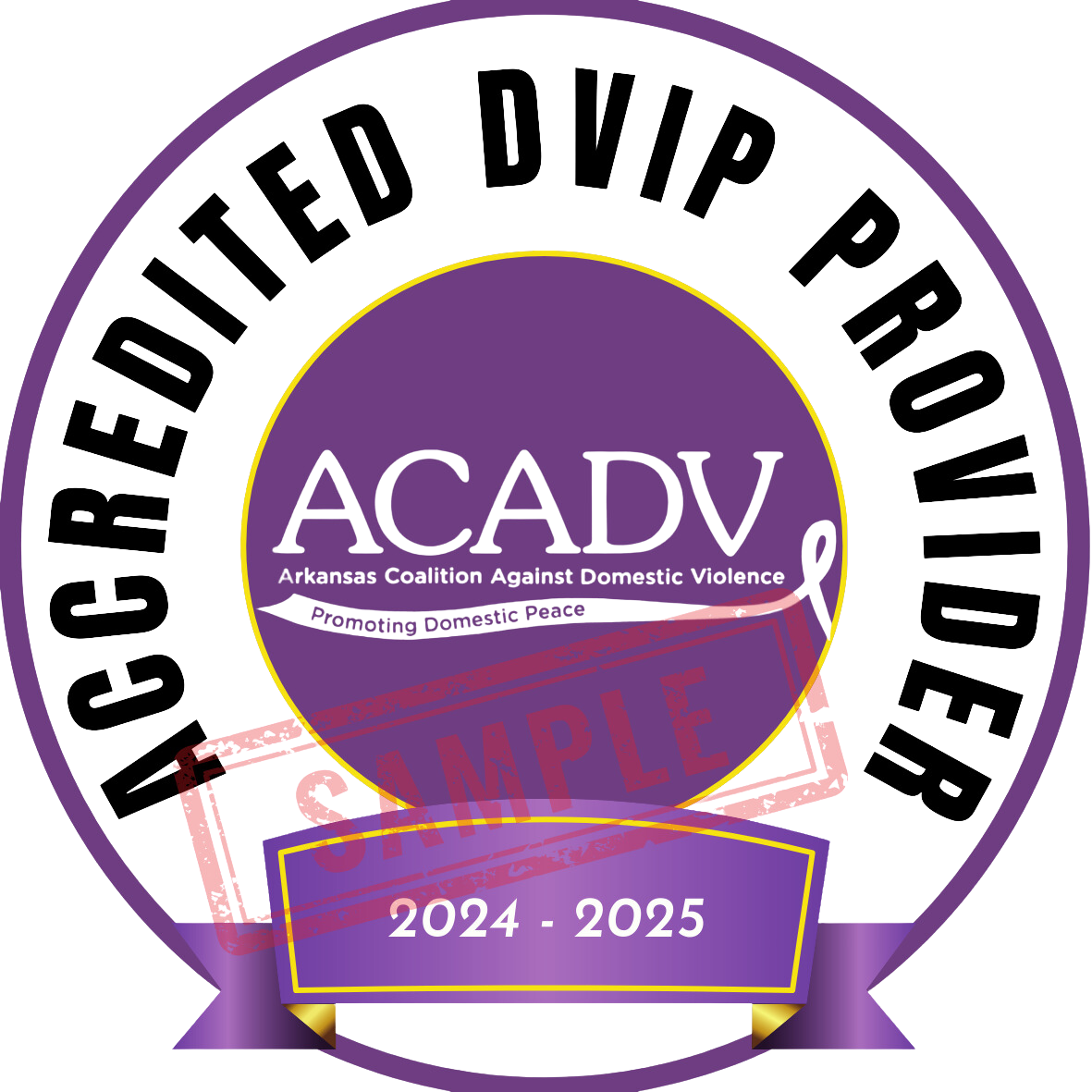Offender Interventions
Domestic Violence Intervention Programs (DVIP)

Intervention Programs
Know the Difference
Domestic Violence Intervention Programs (DVIP)
- Empowering participants to change beliefs and behavior, focusing on abuse and control as the central issue
- Breaking the cycle of abuse by addressing control tactics and promoting a violence-free future
- Offering a comprehensive and long-term intervention with a minimum of 26 sessions
- Emphasizing accountability and highlighting the impact of abusive behavior throughout the program
- Recognizing the influence of sexism and gender socialization, working towards a more equitable future
- Confronting denial, fostering open dialogue, and supporting personal growth
- Promoting a community-wide response to domestic violence as a social issue, ensuring resource awareness and accountability measures
Recommended DVIP Providers

Arkansas Counseling & Wellness

Offers a diverse range of treatment plans guided by compassionate Licensed Mental Health Professionals. The curriculum is carefully designed based on proven research and real-world experience, ensuring effective and supportive care.
- Website: arcounselingandwellness.com
- Email: group@arcounselingandwellness.com
- Phone: (501) 205-4570
- Hours: M-F, 9am – 2pm | Classes are offered on Wednesdays
Recognized Evidence-Based Programs & Curricula for DVIP
This list includes programs and curricula that have been shown effective according to peer-reviewed academic journals and national partners. These curricula have been reviewed by the DVIP Advisory Board and voted to be included in our list of recognized programs.
If you feel a program or curricula should be added or removed, please submit your concerns (with supporting evidence) to info@domesticpeace.com for review by the DVIP Advisory Board during their quarterly meetings.
The STOP Domestic Violence Program
The STOP Domestic Violence Program offers a comprehensive approach focused on empowering individuals, promoting safety, and fostering long-term healing and change. | wwnorton.com/books/9780393714470
Family Peace Initiative
Family Peace Initiative promotes healing and transformation within families affected by domestic violence through trauma-informed care and community support. | www.familypeaceinitiative.com/about
Allies in Change
The Allies in Change model provides an accountable and supportive setting for men to understand the role of male socialization, identify the ways they have been abusive or controlling of others, examine and change their beliefs about abuse, and practice acceptable alternatives to abuse. | alliesinchange.org/the-aic-curriculum
Duluth
“The Duluth Model” is an approach to domestic violence intervention and prevention that focuses on community collaboration and challenging societal norms. | www.theduluthmodel.org/what-is-the-duluth-model/
Conceptual Clarity Model (HEAL Curriculum)
The Conceptual Clarity Model (HEAL Curriculum) is derived from a deep analysis of a progression from awareness to the cessation of harm and the presence of integrity. Developing an understanding of accountability, so that program participants connect their actions with integrity, respect, and honor. | batteringinterventiontraining.com
Emerge
Emerge is an organization committed to ending domestic violence by providing transformative programs and services that empower survivors, educate the community, and promote healthy relationships. | emergedv.com
House of Ruth: House of Ruth Maryland’s Gateway Project
House of Ruth Maryland’s abuse intervention model, “Gateway Project: A Path To Nonviolence” is a 28-week intervention curriculum designed for men who have both used abusive behaviors toward an intimate partner and who experience systemic oppression in their day-to-day lives. | hruth.org
Domestic Abuse Project
The Domestic Abuse Project (DAP) is an organization dedicated to supporting and advocating for survivors of domestic abuse through comprehensive services, including legal assistance, counseling, and community education. | mndap.org
Are you a service provider of DVIP?
If your clinic or agency offers a variety of DVIP, please register their information with our organization (using the form below) so we can get in touch about certification, standards, and other resources for service providers.
For Further Research
Frequently Asked Questions
Why not anger management?
“Anger management has not been found to be effective in reducing recidivism in those who batter” – Bocko, S., C. Cicchetti, L. Lempicki, and A. Powell (Nov. 2004).
Source: https://www.biscmi.org/wp-content/uploads/2015/05/BIP-Effectiveness-1.pdf
“Anger Management Programs and practices place blame on the victim; …diminishing [the abusive partner’s] full accountability and responsibility for [their] behavior…Anger Management practices collude with the abusive partner by disregarding and/or rejecting sexist, misogynist, entitlement, privileged attitudes and beliefs, which perpetuate abuse…Anger Management does not take into account an [abusive partner’s] premeditated controlling behaviors which inflict increasing fear and terror in [their] partner over time…”. – Moshe Rozdzial, NOMAS 2017.
Source: https://nomas.org/position-statement-anger-management-response-mens-violence-women/
Does it work?
“Nationally, research repeatedly indicates that recidivism rates are reduced for those who complete a [domestic violence] intervention program (DVIP).” – (Bocko, S., C. Cicchetti, L. Lempicki, and A. Powell | Nov. 2004), (Eckhardt, C. | Aug. 2003), (Bennett, L., C. Stoops, C. Call, and H. Flett | 2007), Feder, L., and L. Dugan | 2004), (Gondolf, E. | 2002), Klein, A. | June 2009).
Source: https://www.biscmi.org/wp-content/uploads/2015/05/BIP-Effectiveness-1.pdf
“Shown to be effective in reduced official reports of re-arrests, victim reports of reduced re-assaults, and self-reported improvements in women’s lives (Dutton 1986; Chen et al., 1989; Hamberger and Hastings 1990; Palmer, Brown and Berrera 1992; Dobash & Dobash 1999; Gondolf 2004; Kelly & Westmarland 2015; Snow Jones, D’Aagostino, Gondolf & Heckert 2004; Bennett et al. 2007; Boots et al. 2016) “
“Ordering men to attend DVIP can result in ‘gradual but meaningful improvement, in men’s respectful communications, reduced restrictions on women’s liberty, safety and freedom from violence, shared parenting, awareness of self and others, and safer, healthier childhood’ (Kelly & Westmarland, 2015).”
“At least one research report that included children reported that the children of men ordered to attend DVIP had ‘…much more positive relationships with their fathers, reduced fears, and increased feelings of safety after their fathers completed domestic abuse programs’ (Alderson, Westmarland, & Kelly, 2013).
“Stewart, Gabora, Kropp and Lee (2014) evaluated a domestic violence offender program based on RNR and found high levels of change in attitudes about violence against women, in pro-social beliefs and reductions in domestic violence and other violent crime.”
Why 20+ weeks instead of something shorter?
“Length of program can make a difference…[research] compared an 8 week and 26 week program that used the same curriculum, the same number of hours…and the 26 week program showed significant difference” – Davis, R., B. Taylor, and C. Maxwell | Jan 2000). Source: https://www.biscmi.org/wp-content/uploads/2015/05/BIP-Effectiveness-1.pdf
“Batterers who completed the 24-week program, however, did report decreases in physical and verbal aggression at the post assessment period” – Herman, K. Rotunda, R. Williamson, G. & Vodanovich, S | Jan 2014), Source: https://www.tandfonline.com/doi/abs/10.1080/10509674.2013.861316
